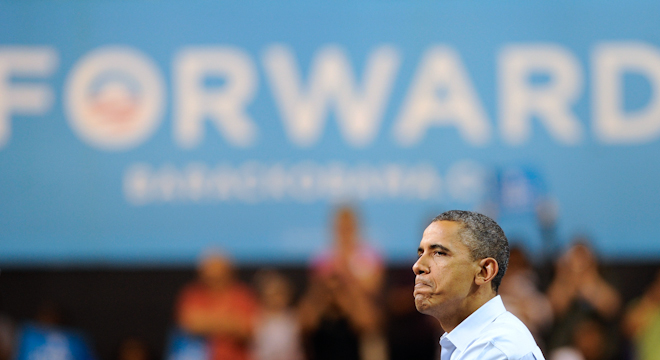Political observers are finally picking up on what Republican governors have been saying for months: The economy is booming. At least where it matters most.
A number of key swing states are significantly outperforming the national economy, prompting a celebration from state leaders even as Mitt Romney tries to draw attention to their ongoing struggles. In Ohio, manufacturing is on the rise thanks in part to the auto rescue, and in Virginia, the unemployment rate stands at an impressive 5.6 percent. Obama happens to have modest leads in both states right now.
So if the recovery is at its most potent in the election’s most critical contests, is Obama on the fast track to re-election? That’s the view of Moody’s Analytics at least, which recently named Obama the favorite based on its electoral model, which focuses on the economic well-being of individual states. After all, the argument goes, if Obama is heading toward wins in Ohio and Virginia, he can afford to lose virtually every other swing state and still prevail over Romney.

There are still other factors in play, like partisanship, which helps explain why Obama is doing well in Nevada, where unemployment is at a worst-in-the-nation 11.7 percent, and doing terribly in North Dakota, which paces the other 49 states at 3 percent unemployment. But Obama seems to be outperforming his national numbers against Romney in at least a few key states where the economy is doing well and lagging behind in North Carolina, which holds a 9.7 percent unemployment rate, and Florida, with 9 percent unemployment.
Obama shouldn’t start re-measuring the drapes on the Oval Office just yet, though. While it makes intuitive sense that voters whose pocketbook hasn’t been hit as badly feel more warmly about Obama, Moody’s isn’t the only model out there. And a number of political scientists are skeptical of whether the economic health of an individual’s state, county or even their own bank statement, is a major factor in his or her vote.
“To the extent that the economy matters, it’s the national economy that matters the most,” John Sides, a political science professor at George Washington University, told TPM. “In general, people’s evaluations of the national economy are stronger predictors of vote choice than are evaluations of their own personal financial circumstances.”
In the corner for the national argument is a 2008 study by Stephen Ansolabehere, Marc Meredith and Erik Snowberg, which examined voters’ perceptions of the economy on the local and national levels over the last four elections. They concluded that while state unemployment was an influence on the voting public, it paled in comparison to the national unemployment rate, which they estimated had five times the impact on a president’s approval rating. A separate study of voting patterns from 1972-2000 also concluded that state and county economic conditions took a backseat to the national economy in voters’ minds.
“The models start from the nation’s economy because people, for whatever reason, are attuned to it,” UCLA political science professor Lynn Vavreck told TPM. “People have tried really hard to show the local economy actually matters more, but they have not been able to demonstrate it. There’s something about people associating the president with the nationwide economy.”
If they’re right, Obama’s standing may be more precarious than it looks as voters begin to pay more attention to the race and drill in on the national economy.
How strong the national recovery needs to be for the president to win in 2012 is heavily debated among stat-heads. The raw unemployment rate on its own isn’t a great indicator of a president’s chances of re-election — it was 7.2 percent when Reagan won 49 states in 1984 — so much as whether job growth is headed in the right direction. Polling blogger Nate Silver estimated Obama needs a net gain of around 150,000 jobs per month based on his approval ratings and past precedent to stay the favorite in the race, but cautioned that economics are not a “holy grail” in determining election outcomes.
A polarized electorate may give Obama a somewhat more resilient approval rating as the coalition that brought him to office — minorities, women, young voters — has remained largely by his side. This helps explain why Obama often leads in national polls even while he sometimes loses independents in the same surveys: His base is simply bigger. Not only that, their voting populations are growing at a faster rate than the Republican’s core demographics, potentially giving Obama a slightly bigger cushion than even just four years ago.
Some experts still think that even a minor state-level effect in just a handful of bellwether 2012 races could help at the margins in a tight national contest. In 2004, for example, many observers thought Ohio was a close race for Kerry because of a manufacturing downturn that affected its economy more than the rest of the country.
“I say the election models are flawed,” University of Virginia political science professor Larry Sabato, told TPM. “I think state unemployment and household income figures can be as important as on a national level — if a campaign focuses on it.”









